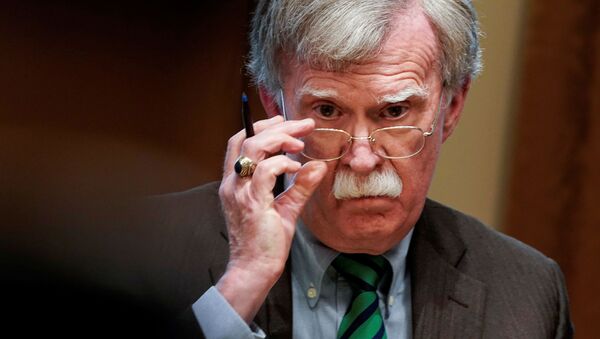US President Donald Trump has taken to Twitter in order to announce that he had asked National Security Advisor John Bolton to resign.
The US president shed light on the fact that he "disagreed strongly with many of his suggestions, as did others in the Administration”, without further specifying.
Trump said he would name a person to replace Bolton next week, while the White House announced that Charles Martin Kupperman would serve as interim national security advisor.
....I asked John for his resignation, which was given to me this morning. I thank John very much for his service. I will be naming a new National Security Advisor next week.
— Donald J. Trump (@realDonaldTrump) 10 сентября 2019 г.
Bolton has also commented on the matter, stating that he had offered to resign on Monday night.
I offered to resign last night and President Trump said, "Let's talk about it tomorrow."
— John Bolton (@AmbJohnBolton) September 10, 2019
Addressing journalists less than two hours after the announcement of Bolton's departure, US Secretary of State Mike Pompeo stated that US foreign policy would not change.
"Many times Ambassador Bolton and I disagreed, that's to be sure," Pompeo told a news conference at the White House.
Later, Bolton's resignation letter appeared in social media.
.@AmbJohnBolton resignation letter (better photo) pic.twitter.com/I5qv8xOl1d
— John Roberts (@johnrobertsFox) 10 September 2019
Purported Rift Over Secret Talks With Taliban
The groundbreaking announcement comes hot on the heels of US media reports shedding light on the purported disagreements between the US president and Bolton over a now-cancelled planned meeting of US officials with the Afghan government and the Taliban movement at Camp David.
While Trump slammed media reports, claiming that he "overruled" US Vice President Mike Pence and advisors on the Camp David meeting as "fake news," he stated that the peace talks were "dead."
On Saturday, the US president announced that he had decided to cancel "secret" talks with the Taliban leadership and Afghan authorities following terrorist attacks in Kabul that left dozens killed, including a US soldier. Trump accused the Taliban of attempting to "build false leverage" to "strengthen their bargaining position," and said that "if they cannot agree to a ceasefire during these very important peace talks, and would even kill 12 innocent people, then they probably don't have the power to negotiate a meaningful agreement anyway."
The Taliban movement has slammed the decision, warning that "the Americans will suffer more than anyone else for cancelling the talks."
North Korea and Iran - Apple of Discord?
Apart from the alleged rift over the Afghan peace talks, earlier media reports suggested that Trump and Bolton had clashed over the US policies on Iran and North Korea. While Bolton has been known for his hard-line stance on Tehran, which has been described as "hawkish", Trump has never ruled out the possibility of holding talks with the leadership of the Islamic Republic, despite the escalation in tensions.
In addition to this, amid Trump's efforts aimed at achieving a thaw with North Korea, Pyongyang has protested Bolton's role in the negotiation process, accusing him of being an obstacle for talks.
During his tenure in the Bush administration, Bolton, who served as the US ambassador to the United Nations, advocated carrying out pre-emptive airstrikes against North Korea's nuclear facilities.
'Extreme Edge of Foreign Policy Hard-Liners'
According to Robert James Spitzer, an American political scientist, commentator, and author, Bolton’s dismissal was not only long anticipated, but hovered over his very appointment over a year ago.
"Bolton represents the extreme edge of foreign policy hard-liners, and while some of his positions coincided with Trump’s, Bolton favoured a much harder line against North Korea, Iran, and other nations. He strongly disagreed with Trump’s in-person meeting with Kim Jong-un, for example; unlike some other administration appointments, Bolton was not a man to suppress his ideological instincts simply to curry favour with Trump”.
Daniel Pipes, an American historian, writer, and commentator has echoed this opinion, saying that "it's only surprising that Bolton lasted as long as he did."
Both analysts have agreed that no major changes should be expected regarding US foreign policy toward Iran, North Korea, or Afghanistan.
In contrast to Spitzer and Pipes, Hooman Majd, an Iranian-American journalist, author, and commentator opined that changes in US foreign policy should be expected following Bolton's dismissal, as Trump "wants to be seen as a dealmaker and not a warmonger" with John Bolton standing in the way of "any foreign policy success before the 2020 election."
"One would expect a softening of attitudes—and demands—with respect to what kind of expectations the US will have of its adversaries in trying to make deals with them. In other words, I think the Bolton stance, which was extremist in its demands, will probably soften to something more manageable."




